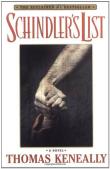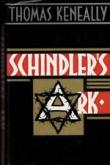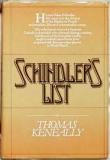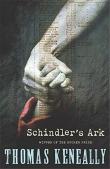AustLit
Latest Issues
AbstractHistoryArchive Description
Adaptations
-
form
y
 Schindler's List
( dir. Steven Spielberg
)
United States of America (USA)
:
Universal Pictures
,
1993
Z218299
1993
single work
film/TV
Schindler's List
( dir. Steven Spielberg
)
United States of America (USA)
:
Universal Pictures
,
1993
Z218299
1993
single work
film/TV
Adapted from Thomas Keneally's account of a Czech businessman and Nazi Party member who tried to make his fortune during the Second World War by exploiting cheap Jewish labour but ended up risking his life and becoming bankrupt in order to save more than a thousand Jewish Poles from the Holocaust.
Oskar Schindler arrives in Krakow (Poland) not long after Germany invades the country. The Nazis' relocation of Jewish citizens has already begun, but their ultimate objective is not yet fully understood by most civilians. Schindler acquires a factory for the production of army mess kits but, with no previous experience of running such an enterprise, he gains the support of Itzhak Stern, a functionary in the local Judenrat (Jewish council) who also has contacts with the underground Jewish business community in the ghetto. They lend him the money for the factory in return for a small share of its products, for trade on the black market. At Stern's suggestion, Schindler hires Jewish Polish workers instead of Catholic Polish workers because they cost nothing: Jewish workers receive nothing because their wages go to the Reich.
When Amon Göth arrives in Krakow to initiate construction of Paszów labour camp nearby, the SS clears Krakow Ghetto, sending in hundreds of troops to empty the cramped rooms and shoot anyone who protests or is uncooperative, elderly, or infirm. Schindler watches the massacre from the hills overlooking the area, and is profoundly affected. He is nevertheless careful to befriend Göth and, with Stern's advice, turns to bribing Göth and other key officials in order to continue enjoying the SS's support and protection. The commandant is a vicious and sadistic man who enjoys shooting Jewish people as target practice from the balcony of his villa overlooking the prison camp he commands.
Schindler gets Göth to agree to build a sub-camp at Paszów for Schindler's workers. The initial motive is to keep his workers safe from the depredations of the guards. When an order arrives from Berlin commanding Göth to exhume and destroy all bodies from the Krakow Ghetto massacre, dismantle Paszów, and ship the remaining Jewish prisoners to Auschwitz, Schindler prevails upon Göth to let him keep 'his' workers. With the Final Solution now fully underway in occupied Poland, Schindler and Stern assemble a list of workers that should keep them off the trains to Auschwitz.
Notes
-
Dedication: To the memory of Oskar Schindler, and to Leopold Pfefferberg who by zeal and persistence caused this book to be written.
Publication Details of Only Known VersionEarliest 2 Known Versions of
Other Formats
- Braille.
- Sound recording.
- Large print.
Works about this Work
-
A National (Diasporic?) Living Treasure : Thomas Keneally
2015
single work
criticism
— Appears in: Le Simplegadi , November no. 14 2015; (p. 20-27) Although Thomas Keneally is firmly located as a national figure, his international literary career and his novels’ inspection of colonial exile, Aboriginal alienation, and movements of people throughout history reflect aspects of diasporic experience, while pushing the term itself into wider meaning of the transnational. -
Which World, and Why Do We Worry about It?
2013
single work
criticism
— Appears in: Scenes of Reading : Is Australian Literature a World Literature? 2013; (p. 16-33)In addressing the question of 'whether or not Australian literature is a world literature', Paul Sharrad looks at three scenes of reading: 'first, the public arena of the literary industry; second, the scenes of our own academic reading; third, the scenes that may result if we do move towards a world literature framework for reading Australian literature' (p.16). His discussion is illustrated with analysis of overseas reception of works by Thomas Keneally and a number of Aboriginal writers.
-
Publishing in the Big Apple : Thomas Keneally's Amazing American Adventure
2013
single work
criticism
— Appears in: Telling Stories : Australian Life and Literature 1935–2012 2013; (p. 385-391) -
Traduit de l’américain : Thomas Keneally and the Mechanics of an International Career
2013
single work
criticism
— Appears in: Book History , vol. 16 no. 2013; (p. 364-386)'Internationally, Thomas Keneally is one of Australia’s most successful authors, whether in terms of critical reception, book sales, or author profile. He is probably best known as the author of Schindler’s List from 1982—Schindler’s Ark in Britain and Australasia—even if his fame in this regard has been somewhat obscured by Stephen Spielberg’s multi-Oscar-winning movie of 1993. The story of how Keneally came to write this book and its subsequent success is one of the more remarkable episodes in Australian book history, and of course it is by no means confined to Australia, its point of origin only in a very qualified sense. Published simultaneously in London, New York, and Sydney, Schindler’s List appeared in at least eight different English-language and fourteen foreign-language editions even before the release of Spielberg’s movie. It won the Booker Prize for 1982, the first by an Australian novelist, although Keneally had already been short-listed for the award on three occasions. Across the Atlantic, it was one of the New York Times ’ Best Books of 1982, and in the following year the winner of the Los Angeles Times Fiction Prize. The movie’s success meant new English and American editions together with a dozen or so translations in 1994 alone, including Turkish, Japanese, Chinese, and Catalan versions. New Czech and Marathi editions appeared as recently as 2009.' (Author's introduction)
-
Now for the Movie
2013
single work
column
— Appears in: Australian Author , April vol. 45 no. 1 2013; (p. 26-29) 'When the film producer calls, asking to option your book, many authors feel a shiver of excitement. Five or even ten years later, many of them are still waiting. The process of adaptation can be even more tortuous than writing a book in the first place as prominent authors tell Anneli Knight.'
-
Untitled
2006
single work
review
— Appears in: 1001 Books You Must Read Before You Die 2006; (p. 703)
— Review of Schindler's Ark 1982 single work novel -
Flawed Hero
2007
single work
review
— Appears in: The Guardian , 12 May 2007;
— Review of Schindler's Ark 1982 single work novel -
Er kan er maar een de beste zijn – het circus van der Booker Prize
1982
single work
review
— Appears in: NRC Handelsblad , 22 October 1982; (p. 4)
— Review of Schindler's Ark 1982 single work novel -
Oscar Schindler – of hoe een vrouwenheld meer dan duizend joden het level redde
1984
single work
review
— Appears in: Het Belang van Limburg , 28-29 July 1984; (p. 27)
— Review of Schindler's Ark 1982 single work novel -
Völlig neue Dimension der Vergangenheitsbewältigung
1983
single work
review
— Appears in: Neue Presse , 21 September 1983;
— Review of Schindler's Ark 1982 single work novel -
'Herr Direktor' : Biography and Autobiography in Schindler's List
2000
single work
criticism
— Appears in: Biography , Winter vol. 23 no. 1 2000; (p. 49-70) -
The List Is Life : Schindler's List as Ethical Construct
2001
single work
criticism
— Appears in: Mapping the Ethical Turn : A Reader in Ethics, Culture, and Literary Theory 2001; (p. 151-164) -
Tom Keneally's Courtship With Hollywood
Kristin Williamson
(interviewer),
1983
single work
criticism
interview
— Appears in: The National Times , 29 July-4 August 1983; (p. 32) -
Oskar Schindler : Thomas Keneally's Schindler's Ark (1982)
2002
single work
criticism
— Appears in: The Booker Prize and the Legacy of Empire 2002; (p. 49-54) -
Man to Man
2004
single work
autobiography
— Appears in: The Sydney Morning Herald , 31 July - 1 August 2004; (p. 4-5) The Age , 31 July 2004; (p. 1, 2) The Best Australian Essays 2004 2004; (p. 3-18) Keneally recounts his accidental and inspiring first meeting in Los Angeles with Leopold Page, a Jewish Pole who survived World War II thanks to the efforts of Nazi, Oskar Schindler. Page told Keneally that he knew 'a wonderful story. A story of humanity ...' The story that emerged took written form as Keneally's Schindler's Ark.
Awards
- 1983 winner 3M Talking Book of the Year Award
- 1982 winner The Booker Prize
-
cGermany,cWestern Europe, Europe,
-
cPoland,cEastern Europe, Europe,
- 1930s
- 1940s






